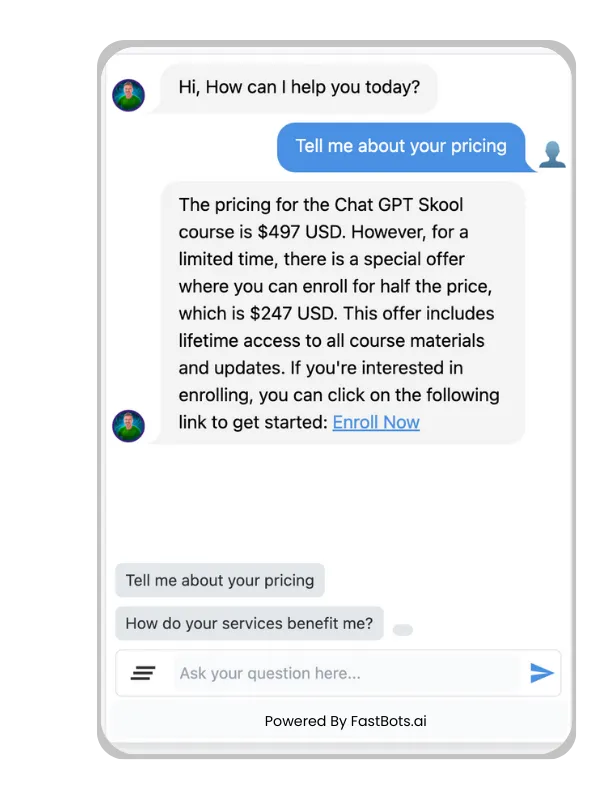The healthcare industry is constantly evolving, and chatbots are playing an increasingly important role in improving patient care and operational efficiency. As a healthcare provider, choosing the right chatbot can be an overwhelming process, considering the variety of options available on the market. This article will guide you through the process of selecting the best chatbot for your healthcare organisation that meets your specific needs and provides positive outcomes for both patients and staff.
Before diving into the selection process, it is important to understand the various applications of chatbots in healthcare. Some chatbots offer general health advice, while others focus on specific areas, such as mental health and cancer care. By identifying the main purpose of the chatbot, you will be better equipped to find a solution that is tailored to your organisation's requirements and goals.
Additionally, it is crucial to consider factors such as user experience, integration with existing systems, and compliance with relevant regulations when selecting a chatbot. By keeping these aspects in mind, you will ultimately choose a chatbot that not only enhances patient care but also streamlines your organisation's operations.
Understanding Chatbot Technology in Healthcare
Defining Healthcare Chatbots
Healthcare chatbots are AI-driven virtual assistants designed specifically to help patients and healthcare professionals. These chatbots leverage artificial intelligence and natural language processing to communicate with users, understand their needs, and provide relevant information or assistance. They can be used for various purposes, such as appointment scheduling, symptom checking, prescription refills, and mental health support.
Some popular examples of healthcare chatbots are:
1. Youper is a chatbot focused on mental health support (source: 7 Best Chatbots in Healthcare That Enhance the Patient Experience).
2. Florence is a personal health assistant chatbot that helps manage medication intake and track health metrics (source: AI Chatbots in Healthcare—Examples and Development Guide).
Benefits of Chatbots in Healthcare
Healthcare chatbots offer numerous advantages to both patients and healthcare providers. Some major benefits include:
- Efficient Communication: Chatbots can provide instant answers to common questions, saving time for patients and healthcare professionals.
- 24/7 Availability: Chatbots are available around the clock, providing support and assistance when it's needed the most.
- Anonymity: For sensitive issues, chatbots offer a safe and anonymous environment for users to discuss their health concerns without the fear of judgement (source: Top 10 Chatbots in Healthcare: Insights & Use Cases in 2024).
- Patient Engagement: By providing personalised and interactive conversations, chatbots can keep patients engaged with their healthcare journey and educate them about their conditions.
- Resource Optimisation: By automating routine tasks and communications, chatbots can help healthcare providers allocate their resources more effectively to high-priority tasks.
In summary, healthcare chatbots are a valuable tool for engaging patients, improving healthcare outcomes, and optimising resources. Choosing the right chatbot for your specific needs is crucial to maximising these benefits and enhancing the patient experience.
BUILD YOUR OWN HEALTHCARE AI CHATBOT
In less than 5 minutes, you could have an AI chatbot fully trained on your business data assisting your Website visitors.
Essential Features of a Healthcare Chatbot
When choosing the best chatbot for healthcare purposes, there are several essential features you should consider. In this section, we'll discuss three key aspects: natural language processing capabilities, HIPAA compliance, and integration with EHR systems.
Natural language processing capabilities
A crucial feature of any healthcare chatbot is its ability to understand and respond to users' questions and concerns effectively. This proficiency comes from Natural Language Processing (NLP), a branch of AI technology. NLP enables chatbots to comprehend human language, process requests, and provide appropriate responses. Look for a chatbot that offers:
- Excellent understanding of user questions: capable of interpreting diverse sentence structures, phrases, and vocabulary.
- Contextual understanding is the ability to maintain a conversation by understanding the context and history of previous interactions.
- Support for multiple languages: Offering multilingual support can cater to a broader range of patients.
HIPAA Compliance
Compliance with the Health Insurance Portability and Accountability Act (HIPAA) is a must-have feature. This important regulation ensures that healthcare chatbots maintain patient privacy and protect sensitive health information. Key compliance aspects include:
- Encryption: secure transmission and storage of data, both at rest and in transit.
- Access control: limiting access to authorised users and implementing robust authentication methods.
- Auditing: logging all activities, as required by HIPAA, and maintaining a clear audit trail.
Integration with EHR Systems
Integration with Electronic Health Records (EHR) systems can significantly enhance the utility of a healthcare chatbot. Seamless integration allows the chatbot to access and update patient information, schedule appointments, and perform various tasks effectively. When evaluating a chatbot's EHR integration capabilities, consider:
- Compatibility: Ensure the chatbot can work with your existing EHR system.
- Customisation: Look for chatbots with the flexibility to adapt to your specific requirements.
- Ease of use: Aim for a chatbot that simplifies, rather than complicates, the EHR interaction process.
By focusing on these three key features, you can make an informed decision when choosing the best healthcare chatbot for your needs.
Evaluating chatbot providers
When choosing the best chatbot for healthcare, it is important to evaluate various chatbot providers based on certain criteria. Here are a few essential aspects to consider:
Vendor Experience and Reputation
Experience: It's crucial to select a chatbot provider with adequate experience in the healthcare industry. This ensures that the provider understands the unique requirements and regulations of this field. Check their client portfolio and case studies to ascertain their expertise.
Reputation: Consider the reputation of the provider in the market. You can research their reviews, ratings, and testimonials from customers to gauge their performance. A well-reputed provider will typically offer better products and after-sales service.
Support and maintenance
Availability: Confirm if the provider offers continuous support and assistance in case of technical issues. Healthcare chatbots need to always be available to cater to patient needs, so having a reliable support system in place is crucial.
Updates and Improvements: A good provider will continuously improve and update their chatbot based on user feedback and industry advancements. Inquire about their track record of delivering updates and enhancements to their products.
Security Measures
Data Security: As healthcare institutions deal with sensitive patient data, it's vital to choose a chatbot provider with robust data security measures. Ensure the provider complies with relevant regulations such as HIPAA, GDPR, and other regional requirements.
Encryption: Your chatbot provider should have end-to-end encryption in place to protect sensitive data from unauthorised access and potential breaches. Confirm their technology capabilities related to encryption and data storage.
By considering vendor experience, support quality, and adherence to security measures, you'll be on your way to selecting a reliable chatbot provider for your healthcare organisation.
Implementing Your Chosen Chatbot
Developing a Deployment Strategy
When implementing the best healthcare chatbot, it's critical to develop a deployment strategy. First, identify the main purpose of your chatbot, such as appointment scheduling, symptom checking, or patient follow-ups. Next, determine the platforms where your chatbot will be available, such as your website, mobile app, or social media channels.
Create a timeline with milestones for chatbot development, testing, and launch. Keep in mind that integrating your chatbot with existing systems, like electronic health records (EHR) or customer relationship management (CRM), may require additional time and resources.
Training healthcare staff
It's essential to train your healthcare staff on chatbot functionality and protocol. Start by educating them on the chatbot's purpose and capabilities, and consider providing:
- Workshops or training sessions to demonstrate usage.
- Documentation with instructions and frequently asked questions (FAQs).
- Points of contact for staff to report issues or provide feedback.
When training your staff, emphasise the importance of maintaining patient privacy and adhering to HIPAA regulations as they pertain to the chatbot and its interactions.
Continuous Improvement and Feedback
Continuous improvement is crucial for any healthcare chatbot. Regularly monitor and assess the chatbot’s performance using quantitative metrics, such as:
Metric Description
Usage Number of users and interactions
Response Time Average time for the chatbot to respond
User Satisfaction Feedback ratings provided by users
Issue Resolution Percentage of issues resolved by the chatbot
Gather qualitative feedback from both users and healthcare staff to identify areas for improvement. This can include surveys, interviews, or focus groups. Analyse this feedback and update your chatbot to address concerns and ensure it remains an effective, user-friendly tool. Implementing regular updates and improvements will help you get the most out of your investment in a healthcare chatbot.

Measuring success and Return on Investment
Key Performance Indicators
To evaluate the effectiveness and ROI of your chosen healthcare chatbot, it's essential to track certain key performance indicators (KPIs). Some critical KPIs include:
1. User adoption rate: the percentage of users who start interacting with the chatbot and continue to use it regularly.
2. Engagement metrics: Analyse the number of interactions, time spent per session, and depth of conversation to understand how engaging your chatbot is.
3. Task completion rate: Evaluate the chatbot's performance in completing specific tasks, such as answering questions, scheduling appointments, or providing information.
4. Accuracy rate: Assess the correctness of the chatbot's responses to ensure they provide accurate and relevant information.
Patient satisfaction metrics
Patient satisfaction metrics are vital in determining the overall success of your healthcare chatbot. Consider the following:
1. Net Promoter Score (NPS): Ask users how likely they are to recommend the chatbot to others on a scale of 1–10. An NPS score of 9 or 10 indicates high satisfaction.
2. User feedback: Collect qualitative feedback from users to identify areas for improvement and better understand their needs, preferences, and pain points.
3. Customer support metrics: track the number of inquiries resolved using the chatbot and measure the reduction in customer support involvement. This can help to gauge both effectiveness and cost savings.
Cost-Savings Analysis
To understand the financial impact of your healthcare chatbot, conduct a cost-savings analysis, which includes:
1. Reduction in manual labour: Estimate the time saved by healthcare professionals and administrative staff by automating tasks using the chatbot.
2. Decrease in operational costs: Consider the drop in expenses associated with customer service, support staff, and infrastructure as a result of the chatbot's implementation.
3. Return on Investment (ROI): Calculate the ROI by comparing the chatbot's costs with the cost savings generated. This helps determine the value of the chatbot to your organisation.
By regularly monitoring these KPIs, patient satisfaction metrics, and cost savings, you'll be better prepared to assess the overall impact and success of your chosen healthcare chatbot. Remember, continuous improvement and adaptation to your users' needs are essential for achieving optimal results.
Frequently Asked Questions
What factors should be considered when selecting a medical chatbot for patient interaction?
What are the key features to look for in a chatbot designed for healthcare services?
How do privacy and security concerns impact the choice of a chatbot for healthcare applications?
What role does AI play in enhancing the capabilities of chatbots in medical settings?
How can one assess the effectiveness of a healthcare chatbot prior to implementing it?
What regulations and compliance standards must a healthcare chatbot adhere to?
BUILD YOUR OWN HEALTHCARE AI CHATBOT
In less than 5 minutes, you could have an AI chatbot fully trained on your business data assisting your Website visitors.


